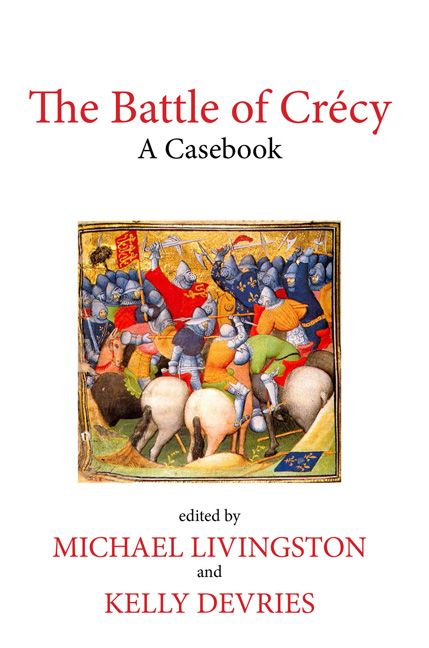Book contents
- Frontmatter
- Contents
- ILLUSTRATIONS
- CONTRIBUTORS
- PREFACE: THE SHAPE OF THE VOLUME
- MAP OF THE CRÉCY CAMPAIGN
- LOSSES UNCOUNTABLE: THE CONTEXT OF CRÉCY
- SOURCES ON THE BATTLE
- NOTES TO THE TEXTS
- ESSAYS ON THE BATTLE
- THE LOCATION OF THE BATTLE OF CRÉCY
- THE BOHEMIAN PARTICIPATION IN CRÉCY
- THE GENOESE CROSSBOWMEN AT CRÉCY
- THE TACTICS OF CRÉCY
- FROISSART'S HERCE AND CRÉCY
- THE ITALIAN PERSPECTIVE ON CRÉCY
- COUNTING THE DEAD AT CRÉCY
- THE AFTER-LIFE OF CRÉCY
- BIBLIOGRAPHY
- INDEX TO THE VOLUME
LOSSES UNCOUNTABLE: THE CONTEXT OF CRÉCY
- Frontmatter
- Contents
- ILLUSTRATIONS
- CONTRIBUTORS
- PREFACE: THE SHAPE OF THE VOLUME
- MAP OF THE CRÉCY CAMPAIGN
- LOSSES UNCOUNTABLE: THE CONTEXT OF CRÉCY
- SOURCES ON THE BATTLE
- NOTES TO THE TEXTS
- ESSAYS ON THE BATTLE
- THE LOCATION OF THE BATTLE OF CRÉCY
- THE BOHEMIAN PARTICIPATION IN CRÉCY
- THE GENOESE CROSSBOWMEN AT CRÉCY
- THE TACTICS OF CRÉCY
- FROISSART'S HERCE AND CRÉCY
- THE ITALIAN PERSPECTIVE ON CRÉCY
- COUNTING THE DEAD AT CRÉCY
- THE AFTER-LIFE OF CRÉCY
- BIBLIOGRAPHY
- INDEX TO THE VOLUME
Summary
On 27 July 1361, King Jean II of France wrote of the toll that had been suffered on both sides of the conflict with England that had begun in 1337:
par les dictes guerres sont maintefoys advenues batailles mortelles, occisions de gens, pillement d'eglises, destruction de cors et perts des ames, deffloration de pucellez et de vierges, deshonestations de famez maries et veuves, arssures de villes, de mannoirs et ediffices, roberies et oppressions, guettemens de voyes et de chemins.
[in these wars many deadly battles have been fought, people slain, churches pillaged, bodies and souls destroyed, young girls and virgins deflowered, respectable wives and widows dishonored, towns, manors, and buildings burned, and robberies, cruelties, and ambushes committed on the paths and roads.]
It is a picture of absolute devastation, a reality in which, he goes on to say, “justice en est faillie” [justice has failed]. Indeed, the impact of his country's war with England was so deep a wound across the countryside — on its people, its prosperity, and even its physical landscape — that he confesses how his mind quakes to see it in its totality: “tant d'autres mals et orribles faix s'en sont ensuyvis, que il ne pourroient estre diz, numbrez ne excriptz” [so many other evils and horrible things have followed from these wars that they cannot be spoken, numbered, or written down]. By signing of the Treaty of Brétigny with England the previous year, Jean le Bon [the Good], as the French king would become known, surely thought peace was at hand. For all the blood, for all the battle, for all the burning of the past twenty-three years, peace had come at last.
Jean died in English hands in 1364. Thus he did not live to see how very wrong he was: the conflict continued, hot and cold, until 1453. None who saw its beginning could have seen its end: the Hundred Years War, as these 116 years of conflict are collectively known, was a generational war.
Those long years of struggle gave to history great figures — like Joan of Arc, Henry V, and the Black Prince — and great moments — like the sieges of Orléans, Rouen, and Calais, or the battles of Castillon, Agincourt, and Poitiers.
- Type
- Chapter
- Information
- The Battle of CrécyA Casebook, pp. 1 - 18Publisher: Liverpool University PressPrint publication year: 2015



